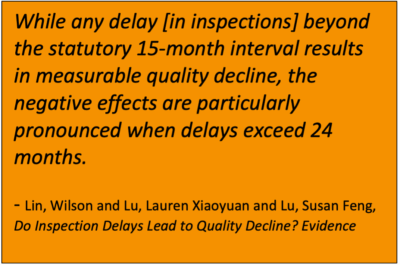The Senior Care Policy Briefing covers important long-term care issues by highlighting policy updates, news reports, and academic research.
Read the full Senior Care Policy Briefing below or download here.
August 15, 2025.
NEWSFLASH
- The Centers for Medicare & Medicaid Services (CMS) will increase Medicare payments to skilled nursing facilities by 3.2% in 2026, providing an estimated $1.36 billion in additional funding.
- While providers welcome the increase, it is unlikely that these taxpayer dollars will result in much needed improvements to staffing and quality without meaningful oversight and accountability.
- U.S. Senators Wyden and Warren have launched a query into UnitedHealth Group’s payment practices for nursing home care in response to alarming reports that UHG is “padding revenues through cost-cutting programs that imperil the health, safety, and lives of vulnerable seniors and people with disabilities living in nursing homes.”
- This follows an investigation by the Guardian which found that UHG “secretly paid nursing homes thousands in bonuses to help slash hospital transfers for ailing residents – part of a series of cost-cutting tactics that has saved the company millions, but at times risked residents’ health.”
- Several large real estate investment trusts (REITs) that own nursing homes and assisted living facilities reported strong profits and earnings in the second quarter of 2025. McKnight’s Senior Living reported that Strawberry Fields REIT posted its “strongest earnings” since the company’s founding. National Healthcare Corporation, another large investor in nursing homes, assisted living, home care, and hospice, reported a 24.7% increase in revenue.
- Though they often claim that they have “razor-thin margins” when lobbying policymakers or speaking to desperate families, data indicate that corporate owners and investors are making substantial returns from long-term care properties. Residents and families – as well as taxpayers – deserve assurance that money flowing into the sector is used to improve staffing, safety, and dignity, not just boost shareholder earnings.
RESEARCH ROUNDUP
- When nursing home inspections are delayed, resident care suffers, according to a recent study. Researchers found that longer gaps between inspections were linked to higher rates of health violations, but surprisingly, survey delays did not affect nurse staffing levels. The study notes that inspection delays became especially common during the COVID-19 pandemic, when many state agencies halted or scaled back standard inspections for months at a time.
- A new study shows that many hospital visits for the sickest nursing home residents could be avoided with better on-site care. Conditions like infections, dehydration, and heart failure can often be treated in the nursing home if staff have the training, resources, and support they need. Unnecessary hospital transfers can cause distress, increase infection risk, and drive up costs.

